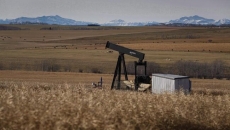Evidence shows a debilitating virus found in British Columbia salmon was transferred from Atlantic fish farms, which then spread from Pacific aquaculture operations into wild fish, says a study published Wednesday.
The researchers used genome sequencing to trace the piscine orthoreovirus, or PRV, that they say was first introduced to B.C. waters from Norway about 30 years ago at the start of open-net pen aquaculture in the province.
The study, published in the peer-reviewed journal Science Advances, says the evidence now suggests the virus is continuously spread between farmed and wild Pacific salmon as they migrate past the farms.
PRV, which devastated salmon farms in Norway, is a disease linked to heart and skeletal muscle inflammation in farmed salmon, and kidney and liver damage in wild B.C. salmon.
The research was conducted by experts from the University of British Columbia and the Strategic Salmon Health Initiative, a partnership of Fisheries and Oceans Canada, Genome BC and the Pacific Salmon Foundation.
"One of the cool things about our study is we demonstrate that this genomic technology, which has been developed to survey viral pathogens in humans, can be translated and used to study a really important fishery resource," said Dr. Gideon Mordecai, a viral ecologist at the university's department of medicine.
In an interview, Mordecai said the researchers sequenced 86 complete PRV genomes and concluded the lineage of the virus in B.C. originates from the North Atlantic.
"This is consistent with the timing of Atlantic salmon egg imports from Europe for salmon farms in the northeast Pacific," the study says.
Mordecai said evidence is mounting that B.C. aquaculture operations pass the virus to wild salmon, with increased infection rates found the closer wild salmon are to the fish farms.
"This virus has been introduced to the region," Mordecai said. "It wasn't naturally here. It's been introduced by people, and it continues to be introduced by the high infections that are in the stocked net pens and that's having an effect."
The B.C. Salmon Farmers' Association said Wednesday it will review the study but pointed to archived salmon tissue from 1977 indicating PRV was present in B.C. waters before the establishment of fish farms.
It said in a statement the PRV strain in B.C. is genetically different from the virus in Europe, while it disputed the UBC research that the disease arrived on the West Coast from Norway.
"We are not importing anything,'" the statement said. "The Atlantic salmon we farm in B.C. is 100 per cent B.C. grown. Our fish are raised in hatcheries on Vancouver Island, from brood stock born and raised on Vancouver Island."
The federal Department of Fisheries and Oceans was not immediately available for comment.
The department has conducted numerous studies on the effects of PRV on farmed Atlantic salmon and wild salmon, but found minimal risk to wild stocks.
Indigenous groups opposed to aquaculture in their traditional territories, especially near the Discovery Islands off northern Vancouver Island, say the proximity of fish farms to wild salmon migration routes increases their disease risk.
The federal government announced the phase out of almost 20 open-net fish farms last December in the Discovery Islands area over the next 18 months.
Mordecai, who earned his doctorate researching honey bee pathogens, said he was spurred to study salmon health after attending academic conferences where government scientists expressed confidence PRV did not pose major risk to wild salmon.
"I thought, 'Well, I better ask that question,'" he said. "The government's lines are the virus poses minimal threat to salmon. It's low risk. It doesn't cause disease and the virus is endemic to the region."
But the genome sequencing results provides evidence that salmon farms serve as a source of the virus to B.C.'s wild salmon, Mordecai said.
The study calls for more monitoring and regulation of infectious diseases threatening wild salmon.
"Although infectious disease is just one of many threats to marine organisms, fully understanding the health status of at-risk wild populations will only be possible if management agencies continue to invest in active monitoring for emerging infectious diseases," says the study.
"Our study highlights the need for robust regulation of aquaculture that may prevent future losses in wild populations, which we propose may be exacerbated by PRV-1 and other emerging infectious diseases."






